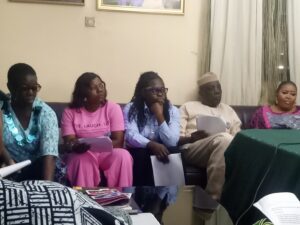By Ihechi Enyinnaya
Descendants of late Herbert Heelas Macaulay, the Father of Nigerian Nationalism, have commended President Bola Tinubu for granting a posthumous pardon to the late patriot but condemned the manner in which it was done, describing it as demeaning to his legacy.
At a press conference in Lagos on Thursday led by Chief Olabode George, former Deputy National Chairman of the Peoples Democratic Party (PDP) and Atona Oodua of Yorubaland, the family insisted that Herbert Macaulay should not have been lumped together with “drug lords and other manner of criminals” in a general pardon list. They said that if the government wished to honour the founding father of Nigerian nationalism, it must do so independently and distinctly.

Speaking on behalf of the familt he said: “If Papa is to be honoured, he must be honoured independently. Herbert Macaulay was not a criminal; he was a patriot, a visionary, and the first son of the first African Bishop. He deserves isolation for national honour, not inclusion in a list of convicts.”
He said Macaulay’s old residence once stood where the General Post Office in Lagos is today, a symbolic reminder of how much he contributed to the birth of modern Nigeria. Other family members present at the event included Mr. Lanre Oshodi, Ms. Mayokun Thomas, Miss Kofoworola Macaulay, Miss Adeyinka Macaulay, Mr. Ayo Ogunlana, and Miss Turi Akereleh.
Chief Bode George, who chaired the press conference, delivered a powerful address titled “Herbert Macaulay: The Father of Nigerian Nationalism,” recalling the life, struggles, and enduring influence of the man who ignited Nigeria’s political awakening. He described Macaulay as a visionary who, despite being born into privilege, chose to confront injustice and colonial oppression when it was far easier to conform.
He traced Macaulay’s journey from his early years as a civil engineer in the colonial service to his resignation in protest against exploitation and hypocrisy in the colonial administration. According to George, that act of defiance marked the birth of Macaulay’s activism and the awakening of Nigeria’s political conscience.
Macaulay, he recalled, wielded the pen as his weapon, co-founding The Lagos Daily News in 1908 to speak truth to power and to expose corruption and injustice. His courageous defense of Oba Eshugbayi Eleko against the colonial government in 1928, George noted, became a moral victory that inspired generations and affirmed the dignity of the African people.
George further reminded the audience that Macaulay founded Nigeria’s first political party, the Nigerian National Democratic Party (NNDP) in 1923 — an audacious act that gave Nigerians their first organized platform for representation and self-expression. The NNDP, he said, championed education, municipal autonomy, and native authority at a time when Africans were treated merely as subjects.
The story of Macaulay, George added, cannot be told without recalling his alliance with Dr. Nnamdi Azikiwe, with whom he co-founded the National Council of Nigeria and the Cameroons (NCNC) in 1944. Even in his eighties, Macaulay traveled across the country to preach unity and self-determination, dying in Kano in 1946 while campaigning for a united Nigeria.
Beyond politics, George emphasized that Macaulay stood for ordinary people — workers, traders, and artisans — and transformed politics into a people’s affair. His nationalism, George stressed, was moral and inclusive, rooted in justice, integrity, and unity in diversity.
He challenged today’s political leaders to look in the mirror of Macaulay’s example and ask whether their politics truly serve the people. “Macaulay’s life reminds us that political power without moral purpose is empty,” he said. “Integrity is not about popularity; it is about principle.”
George urged Nigerians, especially the youth, to draw inspiration from Macaulay’s courage. He called on young citizens to reject apathy, use education and technology as tools for reform, and continue the work that Macaulay began — building a Nigeria governed by justice, not privilege.
Calling for a renewal of patriotic spirit, George declared that Nigeria must return to the moral foundation of its struggle for freedom — the belief that the purpose of power is to uplift the people. “Let us isolate and honour Herbert Macaulay as a national hero,” he said. “Not as one among the condemned, but as one who condemned oppression and gave us the courage to stand as free men.”
Both George and the Macaulay family called on the Federal Government to immortalize the nationalist by naming a major national monument or institution after him, describing him as “the man who lit the torch of Nigerian freedom.”
“Herbert Macaulay’s name must stand alone — not among those who broke the law, but among those who built the nation,” Chief George concluded.
Others members of the Macaulay Family present at the press conference are: Erelu Adeola Macaulay, Mr. Lanre Oshodi, Ms. Mayokun Thomas; Miss Kofoworola Macaulay, Miss Adeyinka Macaulay, Mr. Ayo Ogunlana and Miss Turi Akerele.
-